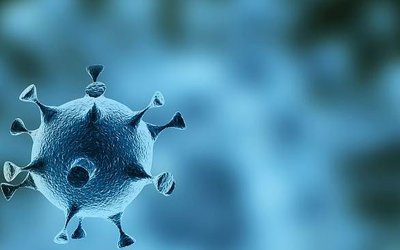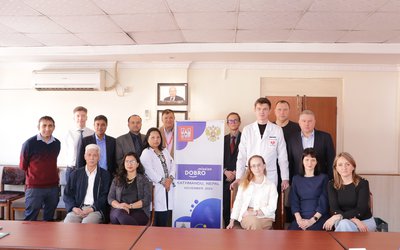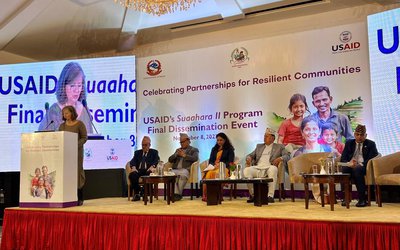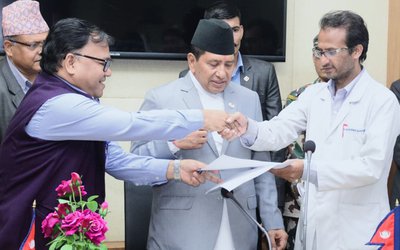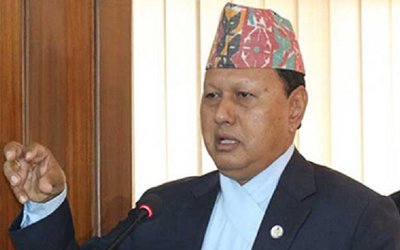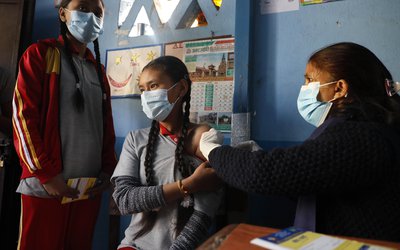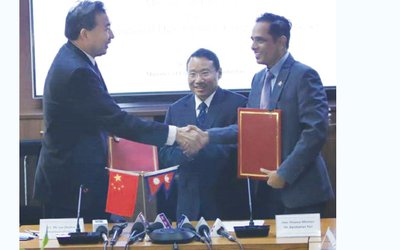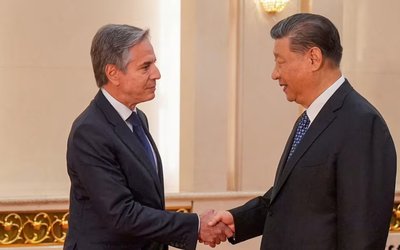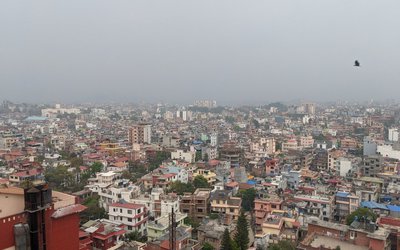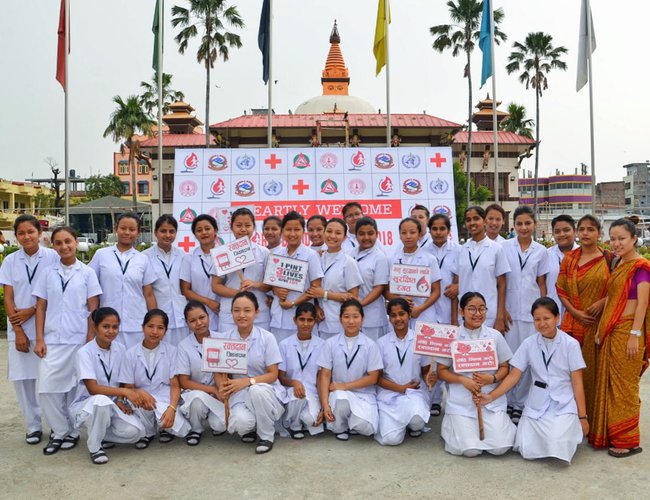
On a rainy evening last week, organizers from the Blood Donation Association of Nepal (BLODAN) – Parsa invited students from various colleges to attend an interaction program on “World Blood Donor Day”( celebrated on June 14), and on the importance of voluntary blood donation, at Rani Sati Mandir, Province No. 2 of Nepal – Birgunj.
BLODAN– Parsa, with The Nepalese Ministry of Health and Population (MoHP), Nepal Red Cross Society (NCRS), National Bureau for Blood Transfusion Services (NBBTS), National Public Health Laboratory (NPHL), and World Health Organization (WHO) - Nepal would begin a 3-day event commemorating “World Blood Donor Day” with a local college debate competition, interaction program with local students and clinicians, and multiple blood donation drives.
As opening remarks in the student interaction, 19-year old Sushila Shrestha, studying 1st year of Bachelor in Business Studies (BBS) in Birgunj Public College (BPC), thanked such blood donation drives for their efforts, and stated how the programs encouraged her to share the importance of donating blood with her community when she returned to her village during her summer vacation.
Students from BPC, Hari Khetan Campus, Thakuram Campus, Anubhuti College, Birgunj Institute of Technology, National Academy, National InfoTech, and Birgunj College started lively discussions then onwards. “This is what we wanted – for the youth to ask more questions to be informed”, stated Bhup Raj Rai, Senior Medical Technologist at NPHL, who has been conducting “World Blood Donor Day” celebrations for the past four years with MoHP.
During the inter-college debate, Akshya Patel, 20, studying BBS from National Academy reiterated similar points, along side his apprehension to donate blood.
“But I decided to donate, and I actually feel proud of my choice”, he exclaims.
Another participant, Sagar Kumar Shah, 22, from BPC, began his remarks on the theme of the debate – “Ways to increase awareness on blood donation program” - with his personal story: “My pregnant aunt was in dire need of blood due to birth complications, and I stepped in to donate blood for the first time.” Shah elaborated on how he realized there really is no replacement for blood and emphasized how the youth should be mobilized to increase awareness. He specially thanked the newly formed Club 25 - Parsa for engaging the youth.
Club 25 - Parsa, a sister organization of BLODAN– Parsa, aims to reduce the scarcity of blood by encouraging youngsters, aged 18 to 25 years, to begin and/or continue to donate blood. By opening a chapter in all the colleges in Birgunj, they want to employ the estimated 10,000 students in Birgunj to be active and participate in such life-saving activities.
Sagar, a member of Club 25 – Parsa, will also donate blood for the 11th time on June 29, on the auspicious date of “Ropain” or the Nepalese rice-planting festival where farmers they plant new seedlings of rice crops of the year in their paddies. Nepal is a country exclusively based on agriculture. In 2017, the club had collected blood from more than 120 participants for the same event, and now, they wish to break that record.
Such engagements of the youths were vibrant in all activities, and Madhu Rana, Vice-chair of NRCS - Parsa, states, “Of course, youths are the best motivators and teachers.”
With the help of the awareness programs conducted by the young men and women, the blood donation drive held that day collected 55 units of blood.
At the same event, Manita Rajkarnikar, Director of Central Blood Transfusion Service from NRCS stated, “We know a lot of people are in need” and elaborated that almost all of the 50 units of blood collected during “World Blood Donor Day” 2017 at WHO – Nepal Country Office, were provided to the needy in various hospitals in Kathmandu within a year.
Later, the interaction program held amongst clinicians focused on strengthening the systems that collect, process, disseminate, store, and transfuse blood. Runa Jha, Chief Consultant Pathologist of NPHL, and Rekha Manandhar-Shrestha, NPHL Consultant Pathologist and NBBTS Co-ordinator, gave their presentation on the correct clinical use of blood and blood product to clinician and health professional around Birgunj. Booklets on surveillance procedures to better manage and regulate blood transfusion chains, produced by the MoHP and WHO – Nepal, were also distributed at the program.
The technicians also prioritized the importance of separating blood into it various components – a process that allows patients to receive only the plasma, platelet, red or white cells they require, leaving the rest to be used as and where needed. Dr. Poonam Khetrapal Singh, WHO Regional Director for South-East Asia, also emphasized such procedures in her media statement, and addressed that members states of WHO should strive to limit the need for blood products in the first place, which can be done by providing high-quality essential services – including antenatal care, disease screening and diagnosis, and health promotion and counseling - so that there is no requirement for blood transfusion.
This seemed the accurate time to hold such programs in Birgunj, as the city now had the capacity to separate blood into its vital components.
An estimated figure of 600 participants from various colleges, blood donation associations, and youth movements joined the rally to raise awareness on donating blood.
Sarita Chaudhary, member of Women Skill Centre Pvt. Ltd., raised her placard proudly stating, “Women usually don’t receive support from their families, or in-laws, to donate blood. Through this platform, we wish to encourage them to donate”, while Rashmina Shrestha, 21, a nursing student from Evergreen College, stated that the students and staff from her college participated in the rally to dispel the misconception that women should not donate blood because people think they are weaker.
According to Arbind Singh, Secretary of BLODAN – Parsa, in 2017, almost 68% of all patients requiring blood donations in Birgunj were female, and to remove such situations, he strives to increase donations by dispelling the myth that one should not donate blood because of religion or gender.
“We are glad we get the opportunity to conduct these programs with various blood donation associations and WHO – Nepal. It will definitely help us spread the right information to the right people to save more lives in Birgunj”, he added.
- Weather Forecast: Partly Cloudy In Bagmati And Koshi Province
- Apr 27, 2024
- Three-Day Global Science-Policy Forum: Socially Inclusive Solar Irrigation Systems Concluded
- Apr 26, 2024
- Nepal And China Ink Two Agreements , PM Prachanda Meets Chinese Delegation
- Apr 26, 2024
- Nepal Army Held National Cyber Security Symposium
- Apr 26, 2024
- Nepal’s Investment Landscape Revitalize By Nine Ordinances: FNCCI President Dhakal
- Apr 26, 2024

